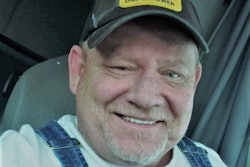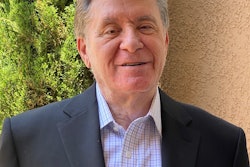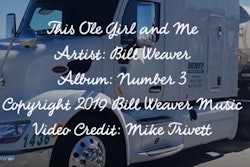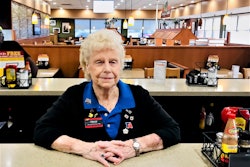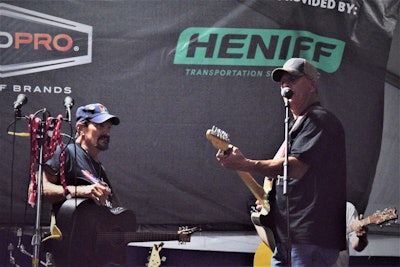 Leon Everette (left) onstage at GATS with Bill Weaver.
Leon Everette (left) onstage at GATS with Bill Weaver.Leon Everette, whose country career included several top ten hits (“Hurricane,” “Midnight Rodeo,” “Just Give Me What You Think Is Fair”…) came out of retirement of a fashion at the urging of his and our friend, Mr. Bill Weaver, wowing crowds at The Great American Trucking Show in Dallas last month. I had the opportunity to sit down with him, and was surprised to learn that Everette attributed his past success in the music business in part to a trucker by the name of Carroll Fulmer.
‘I was a stone cold drunk.’ –Leon Everette
As Everette tells the story, “I had a 1969 Chevy Impala that would only go in reverse. I was playing those old honky-tonks then. A Chevy Impala can do pretty good in reverse, so I’d use it to get to shows. Nowadays, if you did something like that they’d arrest you. It’s about 12 miles from Johnston (S.C.) to Saluda. I’d take it that far anyway, going everywhere in reverse. I’d take it out nights if I had to. The [back-up] lights on an ol’ Impala are pretty good.
“I was playing an old honky tonk and the bartender brought me a drink, said ‘That table over there purchased you a drink, and the gentleman would like to talk to you.’ It was a guy name of Carroll Fulmer. He said, ‘You need to be in Nashville.’ I said, ‘I been to Nashville! I walked the streets of Nashville for six months.’ He said, ‘I got a little trucking company in Florida, and I got a little money. I don’t know nothin’ ’bout the music business, but I think we ought to get in it.'”

Yes, good reader , it was that Carroll Fulmer. He had started out hauling watermelon and cantaloupe out of South Carolina before building the Florida-based trucking company now known as Carroll Fulmer Logistics.
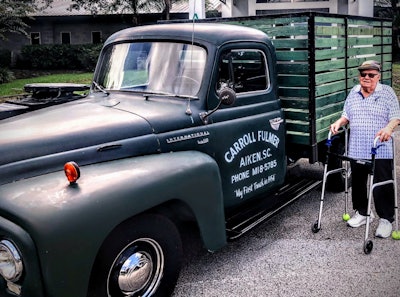 Carroll Fulmer, now 85, with his very first truck. | Photo by Josh Fulmer
Carroll Fulmer, now 85, with his very first truck. | Photo by Josh Fulmer“I thought it was all bull,” Everette says. “But he came to get me in an airplane, and we went to Nashville. We knocked on doors, and every one of them closed in our face.”
But Fulmer was determined to find a way in.
“So we went to the musicians’ union. Carroll said, ‘I want the best session musicians you’ve got, and the best studio in town.’ He got us Phil Ball, Larry London, all the best talent. We cut ‘Over’ and ‘Givin’ up Easy’ at LSI Records.
“Then we went back to beating on doors. Jim Foglesong over at Capitol put ‘Over’ on for about one minute, and that was it. He said, ‘I can find singers like this all day.’ Well, Carroll got mad, said ‘We’re gonna start us a record label.’ So he called it Orlando Records, ’cause he’s from down near Orlando. Then he hires the four best promotion men in the business. These were the same guys the major labels were hiring. ‘Over’ became the only record to go top ten without distribution. Then Carroll fixed the transmission on that old Impala of mine so I could drive it forward. Soon every label in Nashville is calling him up on the phone. His son would say, ‘Daddy, MCA’s on phone.’ Ol’ Carroll’d say, ‘Tell them I’m busy!’ After about a month Carroll called me up and said, ‘I think we’ve let them wait long enough.’
“So we went back to Nashville, and there was deals, deals, deals. We went around to about all of them. At the end of the day Carroll asked, ‘Which one did you like the best?’ I really liked Jerry Bradley at RCA. That was Owen Bradley’s son. [Owen had] worked with Elvis, The Righteous Brothers. Jerry really wanted to get that deal done, but the paperwork had to go through New York City and that could take six weeks. Jerry said, ‘Anyone can tear up a contract, but a man that will shake hands and give his word is good enough for me.’ So Carroll and I did that deal with Jerry on a handshake, and we got a big record deal. It paid me $60,000 just to record an album. The year I signed, they also signed Alabama.
“By 1985 I was worth eighteen million dollars, and I was a stone cold drunk. I was cocky, too. Just a redneck country boy. They took me to rehab. They said I was an incurable alcoholic.”
When RCA execs told him he was going to have to get a new manager, Leon asked after his longtime support from Fulmer: “I said, ‘What about Carroll Fulmer?’ … ‘What’s gonna happen to Carroll Fullmer?'”
RCA said he’d have to make a decision, so he told them what they “could do with Nipper the Dog. You know that little dog they got over there that looks into that record player? That’s Nipper. And one thing you do not do is tell someone at RCA what they can do with Nipper the Dog. I had a song that was at number eight with a super bullet. That meant it was one of the fastest climbing songs on the charts. The next week it wasn’t even on the top 100. It was the fastest fall in the history of country music. I was blackballed.”
Exiled now to Aiken, S.C., Leon started his own nightclub, Hurricane Central, which boasted a seating capacity of 2,550 and would become a hangout for country music royalty.
“You never knew who was going to drop in,” Everette says. “Sometimes Waylon would stop in, get up onstage, and just start playing. Didn’t cost me nothin’.”
But all was not well for Leon. The drinking, if anything, had only gotten worse. His wife had had enough and left him, he says: “She got it all. The Corvette, all the cars, the 7,800 square foot house.” And there was trouble at the nightclub. The fire marshal had shut him down for not having enough exits. “I needed to get reopened fast. All my party people couldn’t get to it like I needed them to. They’d say, ‘Can’t get to it for at least a couple weeks.’ There was a guy, name of Lester Herring. He was a hardcore Christian. I broke down and called him.
“He told me what all I needed. He said, ‘You get the materials, and I’ll be out tomorrow.’ Well, he came out and put that door in. I went to get his money, and he’s already packed up and leaving. I said, ‘How much do I owe you?’ He said, ‘Nuthin’.’ And as he started to drive off, he said, ‘Church starts at 11.’ I started chasing him as he drove off, trying to stuff money where he’d rolled his window down just a crack.
“Well I showed up to church that Sunday drunk as a skunk. I look up and there’s a big grin on Lester’s face. He was a musician. That’s how we got to be friends. I tripped over the threshold in that church and just went rolling over. But it was a little country church, and everyone there was just so nice. I wound up going to that church for six months, drunk as a skunk. I told Diane about it — we met at the club — and she started going with me. We got married in that church. The very first Sunday after we got back [from honeymoon] she got saved. The very next week I followed. They said I was an incurable alcoholic. I had gotten so bad that I would buy brown shoe polish in dry states when on tour, and strain it through a paper towel just to get to the alcohol. Now I was popping tops and pouring out all the liquor I owned. There were no DTs this time.”
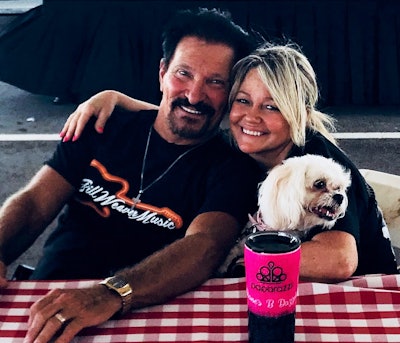 Leon and Diane are pictured here with their dog, Punkin. They spent the Sunday after the GATS show relaxing and talking to drivers in the parking area.
Leon and Diane are pictured here with their dog, Punkin. They spent the Sunday after the GATS show relaxing and talking to drivers in the parking area.The night club would eventually shut down. The venue where Waylon Jennings would come just to visit his old friend would re-open as the Faith Community Fellowship Church, where Leon serves as the worship leader. Today, with a recently rebooted singing career as a gospel artist under the management of the JAM media group’s Jimmy Adams, Everette extends this special invitation to all drivers:
“We’re at exit 22 on I-20. 157 West Frontage Road, Aiken, SC. Services are at 10:30 on Sunday and 7:00 p.m. on Thursday. We’ve got twelve acres of truck parking, and free men’s and women’s showers. It’s my dream to show up at church one day and see that lot slam full of trucks.”
Maybe it all goes back to the sense of gratitude he had towards Carroll Fulmer, the onetime watermelon hauler turned trucking executive. The same acumen with which Fulmer launched the career of Leon Everette would serve to grow his own trucking company and 21 other businesses, making Carroll his own millions. Those Nashville fat cats, to the old trucker, were just obstacles to be circumvented, like so many South Georgia scale houses. I caught up with Mr. Fulmer by phone. He issued the following statement: “I was in my prime, then. Leon Everette is a good artist. I put my heart and soul into him. We parted as friends. He played our 25th wedding anniversary.”
Folks, never underestimate a South Carolina watermelon hauler.
Leon Everette’s latest gospel single can be heard by clicking this link.

